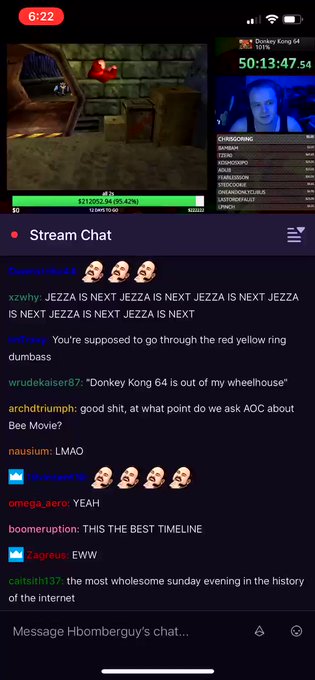
One of the defining features of politics in the 21st century has been the way online cultural phenomena can cross over into the “real” world.
Unfortunately, perhaps because the internet seems to bring out the worst in people, those phenomena have largely been, well, awful.
The defining example is Gamergate: the 2014 campaign of online misogynist harassment that acted as a breeding ground for many of the figures who would go on to enjoy varying degrees of prominence in the alt-right: Milo Yiannopoulos, Mike Cernovich, Ben Shapiro and various others who saw an opportunity to gain real-world popularity. Steve Bannon, whose website Breitbart became the de facto house journal of Gamergate, made it all the way to the White House. When the history of this era is written – if there’s anyone around to write it – future generations will marvel at the fact that the canary in the coalmine for the rise of the far right was a bunch of gamers angry at not getting laid.
Happily, though, last weekend has proved that the internet can also be a force for good. Over the course of 57 long hours, Harry Brewis, who goes by the online handle Hbomberguy, sat playing Donkey Kong 64, trying to gain a 101% completion rate for all the game’s achievements, while raising money for Mermaids, a UK-based organisation that supports gender diverse young people, and which has recently come under attack from tabloids and “concerned” celebrities alike. (It was comedian Graham Linehan’s attacks on the charity that spurred Brewis to start the stream in the first place.)
If you have not heard of Brewis until now, you’re not alone. Until last weekend he was best known for his YouTube channel, which aims to provided well-sourced and reasoned responses to the arguments of the far right. (His most popular videos include “measured responses” to flat earthers, pick-up artists, advocates of the theory that soy makes men feminine and a truly absurd Swedish far-right type who goes by the name “The Golden One”.) As such, he’s part of a small but burgeoning population of online personalities whose politics serve as an antidote to the far-right views that have dominated online politics in recent years.
As the hours ticked by, the stream took on a life of its own. Twitch is, in essence, a site that exists for the basic purpose of allowing people to broadcast the gameplay live as they play video games. Just like everywhere else on the internet, it can be home to terrible people. But it can also be more than that. As Ars Technica’s gaming writer Kyle Orland points out: “These days, Twitch is just as often a place where watching video games serves as a convenient excuse to gather with like-minded streamers and viewers in the closest thing we have to a live digital town square.”
Brewis recognised this potential, and exploited it magnificently. Brewis’s initial funding goal (a modest $US500) was quickly blown out of the water and, by the time he finally turned off his PC emulator – some 57 hours and 48 minutes after turning it on – he had raised US$340,000.
Obviously, the amount of money raised is wonderful. The manner of its raising, though, also felt significant: game streaming, an activity whose most famous proponent once paid two unfortunate Sri Lankan youths $5 on task-delegation website Fiverr to hold up a sign saying “Death to All Jews”, was suddenly being repurposed as a vehicle to raise money for a trans rights charity.
If you have ever sat through a charity telethon – Comic Relief in the UK, the Good Friday Appeal in Australia, the long-running Jerry Lewis Labor Day events in the US – this felt like basically the same thing, except that it was completely DIY and completely online. Instead of IRL celebrities, the celebrity guests who called in were internet famous: Olly from PhilosophyTube! Chuck Tingle! Natalie Wynn of ContraPoints! The donoteat101 guy!
But there were also guests whose fame extends beyond the new socialist corner of the internet. Alexandria Ocasio-Cortez called in briefly, voicing her support for trans rights, lauding the virtues of the Nintendo 64 and dulysending the internet into a frenzy.
And then, a few hours later, Chelsea Manning called in to offer tips on how to beat one of the game’s bosses. Real-world personalities such as singer Cher and writer Owen Jones endorsed the campaign on Twitter, while actor Mara Wilson promoted the stream on Twitter and appeared on it.
Ocasio-Cortez’s presence makes perfect sense: she’s a politician who is plugged into the way that the internet can both feed, and feed off, real life. Her congressional campaign was driven by the Democratic Socialists of America, an organisation whose growing real-world impact is very much driven by its online presence, and her rise has come in parallel with that of the YouTube left and other extremely online leftist types like the Chapo Trap House gang and the Citations Needed podcast.
Some 659,000 people tuned into the stream over the course of its life, and the comment section was a marvel: a feed that flew by at a rate of knots, with comment after comment of support and love, and virtually no-one trolling or MAGA-ing.
The following morning, a bedraggled Brewis logged on briefly to Twitchagain to reflect on what he had done.
“It’s finally properly hit me,” he said. He encouraged anyone wanting to speak to him to “please talk to trans people instead … this weekend has shown their voices still need to be heard”.
[“source=theguardian”]



